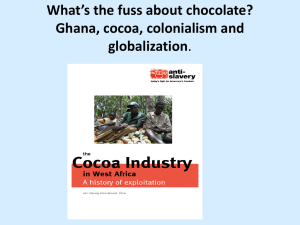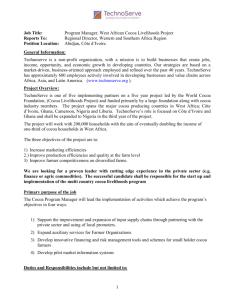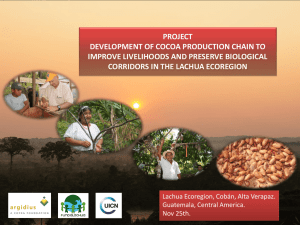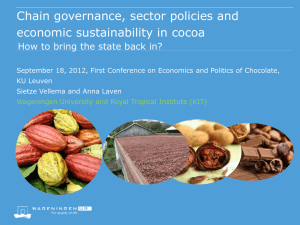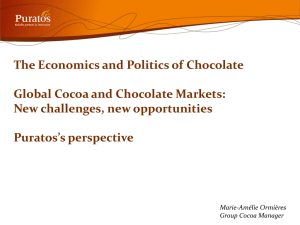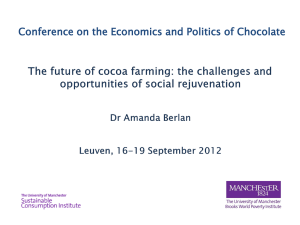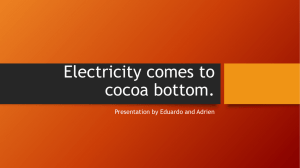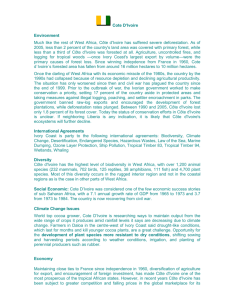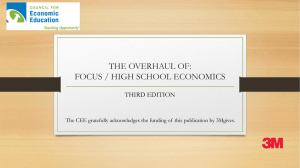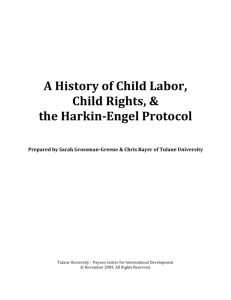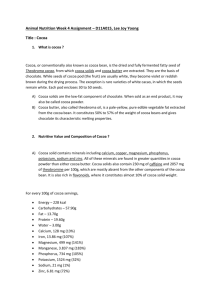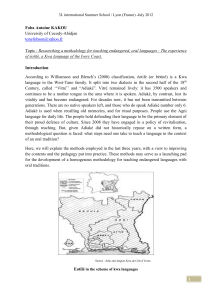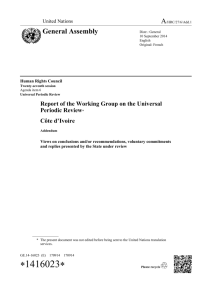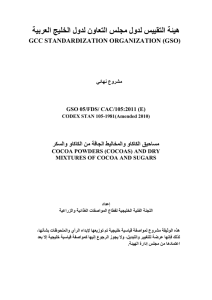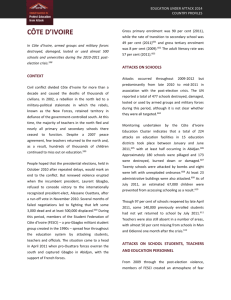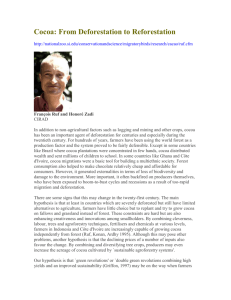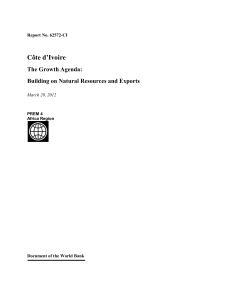The proposed EGRG IV is expected to have a significant positive
advertisement
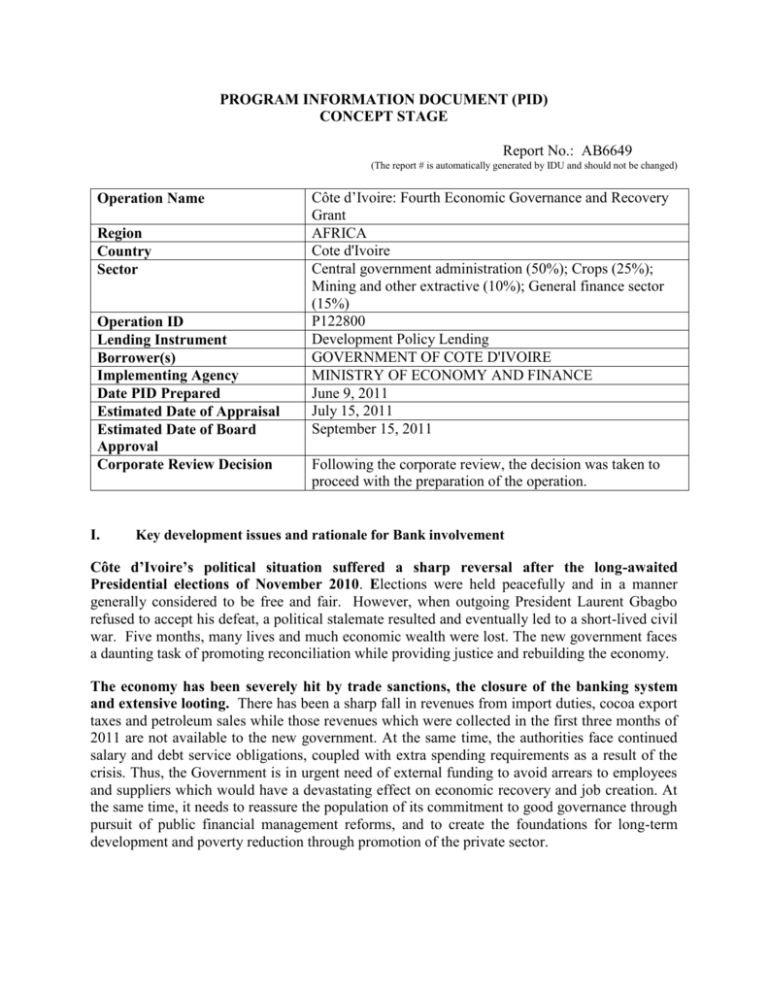
PROGRAM INFORMATION DOCUMENT (PID) CONCEPT STAGE Report No.: AB6649 (The report # is automatically generated by IDU and should not be changed) Operation Name Region Country Sector Operation ID Lending Instrument Borrower(s) Implementing Agency Date PID Prepared Estimated Date of Appraisal Estimated Date of Board Approval Corporate Review Decision I. Côte d’Ivoire: Fourth Economic Governance and Recovery Grant AFRICA Cote d'Ivoire Central government administration (50%); Crops (25%); Mining and other extractive (10%); General finance sector (15%) P122800 Development Policy Lending GOVERNMENT OF COTE D'IVOIRE MINISTRY OF ECONOMY AND FINANCE June 9, 2011 July 15, 2011 September 15, 2011 Following the corporate review, the decision was taken to proceed with the preparation of the operation. Key development issues and rationale for Bank involvement Côte d’Ivoire’s political situation suffered a sharp reversal after the long-awaited Presidential elections of November 2010. Elections were held peacefully and in a manner generally considered to be free and fair. However, when outgoing President Laurent Gbagbo refused to accept his defeat, a political stalemate resulted and eventually led to a short-lived civil war. Five months, many lives and much economic wealth were lost. The new government faces a daunting task of promoting reconciliation while providing justice and rebuilding the economy. The economy has been severely hit by trade sanctions, the closure of the banking system and extensive looting. There has been a sharp fall in revenues from import duties, cocoa export taxes and petroleum sales while those revenues which were collected in the first three months of 2011 are not available to the new government. At the same time, the authorities face continued salary and debt service obligations, coupled with extra spending requirements as a result of the crisis. Thus, the Government is in urgent need of external funding to avoid arrears to employees and suppliers which would have a devastating effect on economic recovery and job creation. At the same time, it needs to reassure the population of its commitment to good governance through pursuit of public financial management reforms, and to create the foundations for long-term development and poverty reduction through promotion of the private sector. II. Proposed Objective(s) The key objective of the proposed EGRG IV is to provide a rapid response to a new government in dire financial straits while supporting essential reforms to improve governance, transparency and efficiency in public expenditure management and in the key sectors of cocoa, energy and finance. This one-tranche development policy operation is a key component of the World Bank strategy to assist the new government in addressing the immediate challenges of reconciling and rebuilding the country. It supports essential governance and economic reforms initiated under the three previous Economic Governance and Recovery Grants, detailed in the Poverty Reduction Strategy Paper (PRSP) adopted in February 2009, and consistent with the new Government’s emerging agenda. Specifically, this grant will deepen policy reforms in public financial management (PFM) and the key cocoa, finance and energy sectors, and promote recovery in the wake of the debilitating political crisis of early 2011. III. Preliminary Description Under the first three EGRGs, substantial improvements have been achieved by the Government in each of the four policy areas (PFM, energy, cocoa and financial sectors) covered by this operation. Even so, there are still challenges that need to be addressed in these sectors. Thus, this operation continues to support the government’s effort to promote efficiency, transparency and accountability in the use of public resources through enhanced public financial management and governance in the energy, cocoa and financial sectors. Specifically, in the context of the implementation of the PRS and to be in line with the PFM action plan, it focuses on the government’s efforts to restore credibility, comprehensiveness, and transparency of the budget. In addition, it contributes to enhancing private sector confidence, investment and growth recovery through improved governance and transparency in the energy, cocoa, and financial sectors. It also paves the way for anticipated debt relief under the HIPC Initiative and MDRI. IV. Poverty and Social Impacts and Environment Aspects Poverty and Social Impacts The proposed EGRG IV is expected to have a significant positive direct impact on poverty reduction. It builds on the findings of the June 2006 World Bank report “Côte d’Ivoire – Contributions to the analysis of poverty”, the analysis of the 2008 household budget survey in the PRSP, and the recently completed poverty and social assessments. These found poverty increasing against the backdrop of a continued decline in per capita incomes. The emphasis on cocoa reforms is particularly important given the large number of poor rural households producing cocoa, which are estimated to account for 28 percent of the poor in Côte d’Ivoire. Both partial and general equilibrium analysis confirms that reduced cocoa taxation will improve the incomes of cocoa producers. By one estimate, a 10 percent reduction in cocoa taxes would increase the value of cocoa output by 16 percent. Furthermore, improvements in the cocoa sector will raise the rural wage, thereby benefiting rural laborers who are generally among the poorest and most difficult to assist. A new study has been conducted by the authorities with support from IDA which confirms that tax and price changes are generally transmitted to the producer, while recommending ways to further improve the transmission mechanism. Environment Aspects The specific reforms supported by the proposed development policy grant are not likely to have significant negative effects on the country’s environment, forests and other natural resources. Any likely adverse effects are expected to be minor and manageable through the existing Bank framework. The reforms supported aim primarily to strengthen economic governance at the national government level. The measures to improve management of public finances and the cocoa sector are not considered to carry environmental implications. It is not expected that the export tax reductions included in the current operation will have any significant impact on the environment. If there is an effect on production, it will likely be to slow down the exodus of farmers from the sector, which is already happening, rather than to promote any expansion in the area under cultivation. The Bank has recently completed a post-conflict Country Environmental Analysis looking at the forestry, mining, urban, and environmental governance sectors. The study reveals the following challenges: (i) weak or almost non-existent mechanisms for the collection, analysis and dissemination of environmental information; (ii) weak intersectoral collaboration of the Environment Ministry with ministries responsible for water resources, transport, fishing, agriculture, and energy; and (iii) low funding available to the sector both from Government, the private sector and development partners. Far reaching recommendations were proposed including assisting the Government to develop an action plan for the forestry sector for the period 2008-15 and establishing a national environmental information system. V. Tentative financing Source: BORROWER/RECIPIENT International Development Association (IDA) Borrower/Recipient IBRD Others (specify) ($m.) 0 100 Total VI. Contact point World Bank Contact: Title: Tel: Fax: Email: VII. Philip English Lead Economist, AFTP4 (202) 473-6483 (202) 473-8368 penglish@worldbank.org For more information contact: 100 The InfoShop The World Bank 1818 H Street, NW Washington, D.C. 20433 Telephone: (202) 458-4500 Fax: (202) 522-1500 Web: http://www.worldbank.org/infoshop

